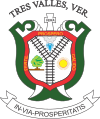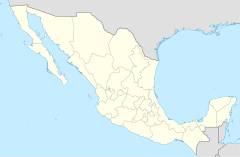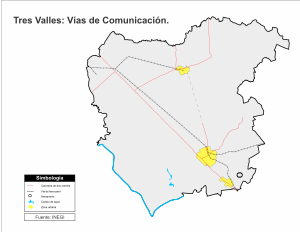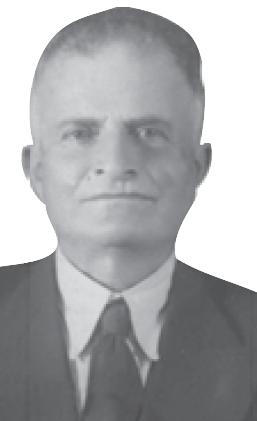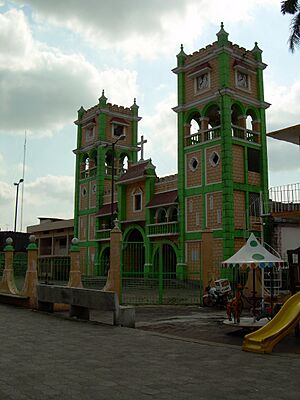Tres Valles facts for kids
Quick facts for kids
Tres Valles
|
||
|---|---|---|
|
||
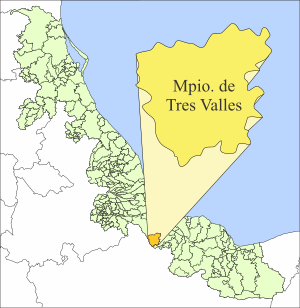
Location of Tres Valles within Veracruz State
|
||
| Country | ||
| State | Veracruz | |
| Region | Papaloapan | |
| Municipality | Tres Valles | |
| Area | ||
| • Total | 378.1 km2 (146.0 sq mi) | |
| Elevation | 40 m (130 ft) | |
| Population
(2010)
|
||
| • Total | 45 097 | |
| • Density | 82.3/km2 (213/sq mi) | |
| Time zone | UTC-6 (CST) | |
| • Summer (DST) | UTC-5 (CDT) | |
| Postal code |
95300
|
|
| Area code(s) | 288 | |
| Website | http://www.tresvalles.gob.mx/ | |
Tres Valles (which means "Three Valleys") is a town and municipality in the Mexican state of Veracruz. It became its own independent municipality on November 25, 1988. The town is located near the Papaloapan River and shares borders with the state of Oaxaca, as well as the towns of Tierra Blanca and Cosamaloapan.
The main way people in Tres Valles earn money is through farming. They grow a lot of sugar cane. Other important crops include rice, corn, beans, pineapples, sorghum, and mangoes.
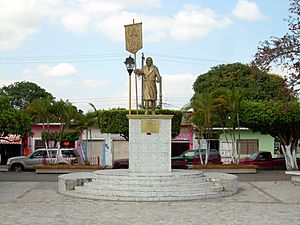
Contents
The Story Behind the Name
It's not completely clear how Tres Valles got its name. The most common idea is that it was named after three valleys nearby. These were Valle Nacional, the Valley of Tesechoacán (now called José Azueta), and Playa Vicente. The name "Three Valleys" was first known to be used around 1962.
Early History of Tres Valles
The area around the lower Papaloapan River was first home to the Olmec people. They disappeared for reasons we don't know. Later, the Totonac lived here from about 500 to 100 BCE. By the time the Spanish arrived, the Mexicas (Aztecs) had taken control of this area, just like many other Mesoamerican lands.
When the Spanish came, the land that is now Tres Valles was split between two areas: Cosamaloapan and Puctlancingo. The only known settlement within today's Tres Valles limits was Puctlancingo. It was located where the Amapa and Tonto rivers meet. There might have been other small villages too. A map from 1584 shows a hill with old ruins called Quateupan near the Tonto River.
Tres Valles in Colonial Times
After the fall of Tenochtitlan (the Aztec capital), Hernán Cortés sent his captain, Gonzalo de Sandoval, to conquer the Tuxtepec area. After succeeding, he made the people of the Papaloapan basin part of the encomienda system. This system meant that Spanish settlers were given control over groups of Native Americans and their land.
In 1600, Tuxtepec and Puctlancingo were added to the Guaspaltepec region. Later that year, Guaspaltepec was abandoned. Its people moved, and the area came under the control of Cosamaloapan. In 1786, the Spanish crown created the Municipality of Veracruz. This area remained a Canton until 1917, becoming important for local government.
How Tres Valles Was Founded
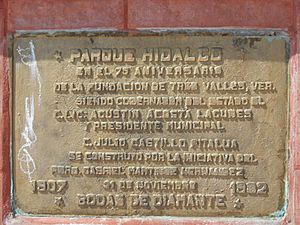
November 21, 1907, is often seen as the founding date of Tres Valles. However, the exact date is not truly known. This date first appeared in 1982 when a monument to Miguel Hidalgo was put in the city's main park. It seems this date was chosen during the monument's planning. There is also a document from November 24, 1939, that says the town was founded "32 years ago," which would be around 1907.
Historians believe the settlement existed since at least 1900. It started as a camp for workers building the Pacific Veracruz railway. A key event around this time was the arrival of the Martinez family in 1907. They owned the land where the town grew. It's possible that this and other events from that period led people to consider 1907 as the founding year.
Tres Valles After the Revolution
In 1921, Tres Valles had 791 people living there. In 1924, the first school was built. It is now called the "March 18" School. Professor "Nacha" from Tierra Blanca, Veracruz, was its first director. Ignacio Martinez, who also donated the land, built the school.
Also in 1924, Martinez built the first Catholic chapel. It was dedicated to Our Lady of Guadalupe. This building is now the Municipal Agency. The chapel was taken apart during the Cristero War, a conflict over religious freedom.
The area once had a big banana industry. But this ended because of a plant disease called the Sigatoka fungus. Soon after, President Lázaro Cárdenas took over the three banana companies. They were then combined into one company called "Transcontinental."
Geography of Tres Valles
| Geographical Maps of Tres Valles | |
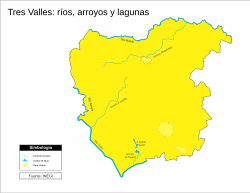 |
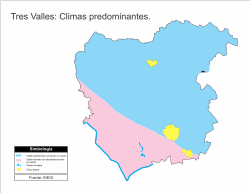 |
| Waterways | Climates |
Where is Tres Valles Located?
The municipality of Tres Valles covers about 378.1 square kilometers. It is in the south-central part of Veracruz. Its exact location is between 96°01' and 96°18' west of Greenwich and between 18°10' and 18°25' north. It is in the Papaloapan region, bordering Oaxaca and the towns of Tierra Blanca and Cosamaloapan.
Rivers and Waterways
The most important rivers in Tres Valles are the Amapa and Tonto. Other important rivers and streams include the Hondo, Mondongo, Coyote, Zapote, and Jobo.
What is the Climate Like?
Tres Valles has a warm and humid climate. It gets very little rain in winter, less than 5% of the yearly total. The main rainy season is in autumn. June is usually the hottest month of the year. There isn't a weather station right in Tres Valles. The closest one is in Ciudad Alemán.
| Climate data for CD. Alemán, Veracruz | |||||||||||||
|---|---|---|---|---|---|---|---|---|---|---|---|---|---|
| Month | Jan | Feb | Mar | Apr | May | Jun | Jul | Aug | Sep | Oct | Nov | Dec | Year |
| Record high °F | 97.7 | 103.1 | 107.6 | 109.4 | 113.9 | 112.1 | 104.0 | 101.3 | 102.2 | 99.5 | 96.8 | 95.0 | 113.9 |
| Mean daily maximum °F | 81.1 | 83.5 | 89.6 | 93.9 | 96.8 | 93.2 | 90.7 | 90.7 | 89.8 | 87.4 | 84.6 | 81.9 | 88.5 |
| Mean daily minimum °F | 63.0 | 63.7 | 67.1 | 70.7 | 73.9 | 74.1 | 72.7 | 72.7 | 72.9 | 70.9 | 68.0 | 64.9 | 69.6 |
| Record low °F | 50.0 | 32.0 | 51.8 | 57.2 | 64.4 | 66.2 | 66.2 | 66.2 | 65.3 | 58.1 | 54.5 | 45.5 | 32.0 |
| Average precipitation inches | 1.37 | 1.07 | 0.83 | 1.06 | 4.09 | 13.04 | 16.57 | 14.95 | 14.20 | 6.33 | 3.26 | 1.86 | 78.63 |
| Record high °C | 36.5 | 39.5 | 42.0 | 43.0 | 45.5 | 44.5 | 40.0 | 38.5 | 39.0 | 37.5 | 36.0 | 35.0 | 45.5 |
| Mean daily maximum °C | 27.3 | 28.6 | 32.0 | 34.4 | 36.0 | 34.0 | 32.6 | 32.6 | 32.1 | 30.8 | 29.2 | 27.7 | 31.4 |
| Mean daily minimum °C | 17.2 | 17.6 | 19.5 | 21.5 | 23.3 | 23.4 | 22.6 | 22.6 | 22.7 | 21.6 | 20.0 | 18.3 | 20.9 |
| Record low °C | 10.0 | 0.0 | 11.0 | 14.0 | 18.0 | 19.0 | 19.0 | 19.0 | 18.5 | 14.5 | 12.5 | 7.5 | 0.0 |
| Average precipitation mm | 34.9 | 27.2 | 21.0 | 27.0 | 103.9 | 331.1 | 420.8 | 379.8 | 360.8 | 160.7 | 82.8 | 47.2 | 1,997.2 |
People of Tres Valles
Tres Valles is one of the most populated municipalities in its region. Only Tierra Blanca and Cosamaloapan have more people.
Main Towns and Villages
Here are some of the main population centers in Tres Valles:
| Population Centres | |||
| Population Centre | Coordinates | Population 2005 | Distance from municipal seat(km) |
|---|---|---|---|
| Tres Valles | 18°14′00″N 96°08′00″W / 18.23333°N 96.13333°W | 16030 | 0 |
| Los Naranjos | 18°21′14″N 96°09′59″W / 18.35389°N 96.16639°W | 3444 | 13 |
| Novara | 18°12′00″N 96°06′32″W / 18.20000°N 96.10889°W | 2650 | 5 |
| Poblado 3 | 18°17′24″N 96°05′33″W / 18.29000°N 96.09250°W | 2186 | 7 |
| Col. Obrera | 18°15′24″N 96°09′42″W / 18.25667°N 96.16167°W | 1821 | 3 |
| Sources: INEGI | |||
Different Ethnic Groups
In 2010, a census showed that out of 42,846 people over three years old in Tres Valles, 3,364 belonged to an indigenous group. This means they speak an indigenous language. This group makes up about 7.85% of the population.
| Language | Speakers | Males | Females |
| Chinantecan | 1989 | 895 | 1094 |
| Mazatecan | 804 | 398 | 406 |
| Zapotec | 48 | 22 | 26 |
| Náhuatl | 35 | 17 | 18 |
| Mixtecan | 27 | 10 | 17 |
| Mayan | 6 | 6 | 0 |
| Cuicatec | 3 | 1 | 2 |
| Ixcatec | 2 | 1 | 1 |
| Popoluca | 2 | 1 | 1 |
| Huave | 1 | 1 | 0 |
| None Specified | 43 | 23 | 20 |
| Total | 2960 | 1375 | 1585 |
Roads and Transportation
Tres Valles has many roads, both paved and gravel. These roads help people travel within the municipality and to other towns.
Major Highways
Federal Roads
The main federal road is Highway 145. It connects La Tinaja, Ciudad Alemán, and Sayula. This road is paved and has two lanes. It passes through important towns like La Granja, Tres Valles, and Novara. The main industries of the municipality, like the sugar and paper mills, are located along this road.
State Roads
- The Tres Valles – Poblado 3 Road has two paved lanes.
- The Tres Valles – Los Naranjos Road is paved for part of the way, from Tres Valles to Loma San Juan.
- The Loma San Juan – Los Naranjos Road is a two-lane dirt road.
Interstate Roads
- The La Granja – Temascal Road has two paved lanes.
Fun Festivals
Tres Valles celebrates several popular festivals throughout the year:
- The Festival of Flowers takes place during the last week of March and the beginning of April.
- Carnival is celebrated in April.
- The Feast of Christ the King is on November 20.
- An Agricultural, Livestock, Cultural, and Industrial Fair is held during the last week of November.
Famous People from Tres Valles
Ignacio Martínez Gutiérrez
Ignacio Martínez Gutiérrez was born in 1884 and passed away in 1966. He was the son of Refugio Gutierrez Gil and Jesús Martínez Ochoa. He served as the Municipal Agent of Tres Valles. When smallpox affected the region, he started a school that later became known as "March 18."
On May 25, 1906, he married Trinidad Hernández Huerta. They moved to the Tres Valles area and took ownership of about 2,500 acres (10 square kilometers) of land. There, he started a plantation and helped found Tres Valles. He had several children, some of whom became priests, including Father Jesus, Brother Ignacio, and Father Gabriel Martinez.
Gabriel Martínez Hernández
Gabriel Martínez Hernández, known as Father Gabriel, was born on January 6, 1921. He went to a boarding school with his older brothers at a Marist College in Tlalpan, Mexico when he was young. He decided to become a priest at age 13 and entered a seminary in 1933.
He became a priest on March 25, 1944. He first served in Naolinco, Veracruz, for two and a half years. On September 21, 1946, he was appointed the Vicar of Tres Valles. He arrived on October 22 of that year. It was a challenging time for religious work because authorities had tried to stop people from practicing their faith. However, the people were excited to have a spiritual leader. Tres Valles only had a simple chapel outside the city. So, Father Gabriel worked to build a new chapel in a central location, which was completed on December 5, 1976.
Francisco Sánchez Contreras
Francisco Sánchez Contreras was born in Tres Valles on September 23, 1938. He studied Law at the University of Veracruz. In 1963, he helped promote community activities for the Department of Social Action. In 1969, he became the Organizing Secretary of the CDE, PRI.
He wrote many articles about social and political topics. On February 16, 1987, he served as Secretary of the Joint Land Commission. He passed away on May 30, 2011, in Xalapa, Veracruz.
Ignacio Villaseñor Arano
Ignacio Villaseñor Arano was born in Tres Valles on December 6, 1942. He studied International Relations at UNAM and the Catholic University of Leuven. In 1973, he became a Deputy Director General in the Foreign Service. In 1976, he became Deputy Director General of Foreign Service and Director of the Mexican Embassy in Britain in 1977.
He became Managing Director of Regional Organizations in 1979. In 1982, he was a minister and chargé d'affaires in the U.S.. Later, he became Senior Director for Bilateral Affairs. In 1989, he became the Ambassador to Ecuador. He has received awards from many countries.
Economy of Tres Valles
Local Industries
Sugar Mill
The Tres Valles sugar mill was built by the Mexican government in 1978. Its purpose was to produce refined sugar for making soft drinks. Since 1988, PIASA has operated the mill. It can process about 11,000 tons of cane every day. This allows it to produce over 1,500 tons of sugar in 24 hours.
Pulp and Paper
On June 22, 1972, a company called Papel Periódico was created. This happened under the orders of Mexico's president at the time, Luis Echeverría Álvarez. Its goal was to make newsprint using sugarcane as the main material.
Farming and Agriculture
Sugarcane Farming
Tres Valles is the biggest producer of sugarcane in the state of Veracruz. It is also the fifth largest nationally. In 2009, about 28,000 hectares of land were used for growing sugarcane. Of that, 24,000 hectares were processed by the Tres Valles mill. The sugar industry provides the most jobs in the area. It is the main source of income for at least 14,000 people.
Rice Farming
Within Mexico, Veracruz and Campeche are the main states that produce rice. Tres Valles is the largest producer of rice in Veracruz. It is also the top rice producer in the entire country.
Other Crops
Tres Valles has very fertile land. Many other agricultural products are grown here for people to eat or sell. These include:
| State Position | Product | Area under cultivation (Hectares) |
Production (Tonnes) |
Value (Mexican Pesos) |
|---|---|---|---|---|
| 83 | Corn | 1 330.00 | 2940.00 | 5 810 880 |
| 7 | Sorghum | 750.00 | 2100.00 | 3 150 000 |
| 9 | Pineapples | 30.00 | 1245.00 | 3 703 880 |
Places to Visit
The most important buildings to see in Tres Valles are the Municipal Palace (built after 1988) and the parish church of Christ the King.
There are also several monuments:
- A statue of Don Miguel Hidalgo y Costilla.
- A bust of Benito Juárez, known as the "Father of the Americas."
- A bust of Emiliano Zapata.
- A monument dedicated to mothers.
Delicious Food of Tres Valles
Tres Valles has a rich food culture. Over time, it has been influenced by the Chinantec and Mazatec people who have settled in the area. Some of the tasty local foods include:
 | May Edward Chinn |
 | Rebecca Cole |
 | Alexa Canady |
 | Dorothy Lavinia Brown |


